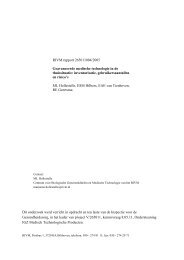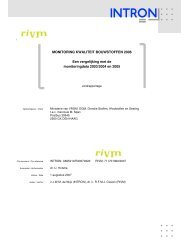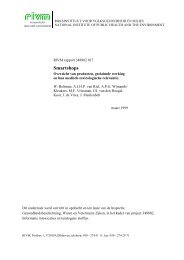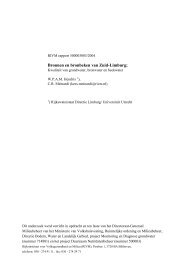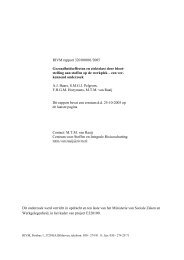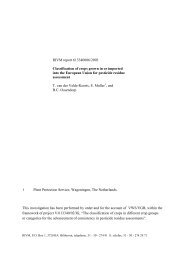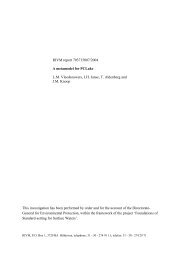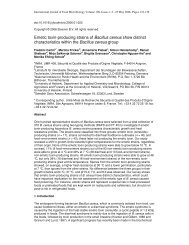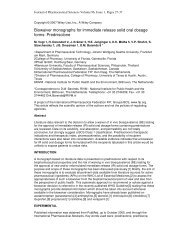The Contribution of cocoa additive to cigarette smoking addiction
The Contribution of cocoa additive to cigarette smoking addiction
The Contribution of cocoa additive to cigarette smoking addiction
You also want an ePaper? Increase the reach of your titles
YUMPU automatically turns print PDFs into web optimized ePapers that Google loves.
Page 154 <strong>of</strong> 207 RIVM report 650270002<br />
Phenylethylamine<br />
phenylethylamine in neural processes underlying reward or reinforcement. Evidence<br />
for reinforcing properties <strong>of</strong> phenylethylamine in the drug self-administration and<br />
place preference paradigms have been investigated (38).<br />
<strong>The</strong> reinforcement properties <strong>of</strong> phenylethylamine compared <strong>to</strong> amphetamine or<br />
cocaine were investigated in dogs. <strong>The</strong> relative potencies <strong>of</strong> these compounds in<br />
maintaining self-administration behaviour during the 4-hr session was damphetamine<br />
greater than cocaine greater than or equal <strong>to</strong> phenylethylamine. It was<br />
concluded that phenylethylamine can function as a reinforcer or may play a<br />
physiological role in the reinforcement process (39). Furthermore, it was shown that<br />
in MAOI-B treated squirrel monkeys, phenylethylamine (0.3 – 1.0 mg/kg) affected<br />
the discriminative-stimulus and reinforcing-stimulus compared with amphetamine<br />
(0.3 mg/kg) (40).<br />
Effects <strong>of</strong> <strong>smoking</strong> cessation<br />
No data available.<br />
Critical assessment<br />
Phenylethylamine has reinforcing properties qualitatively comparable <strong>to</strong><br />
amphetamine. Whether phenylethylamine in <strong>cigarette</strong> plays a role in the reinforcing<br />
effect <strong>of</strong> <strong>cigarette</strong> <strong>smoking</strong> is unknown.<br />
Conclusion<br />
Phenylethylamine has reinforcing properties.<br />
COMMERCIAL USE<br />
No data available.<br />
BENEFICIAL EFFECTS<br />
In depressed subjects treated with an MAOI, phenylethylamine markedly improves<br />
mood (because phenylethylamine is rapidly metabolized by MAO, phenylethylamine<br />
alone produces no noticeable effects). <strong>The</strong> addition <strong>of</strong> 10 <strong>to</strong> 30 mg/day <strong>of</strong><br />
phenylethylamine <strong>to</strong> current treatment with amitryptiline plus phenelzine terminated<br />
the episode <strong>of</strong> depression in 2 <strong>of</strong> the 3 inpatients with major depressive disorder who<br />
had not achieved any significant recovery with tricyclic antidepressants, MAOI, or<br />
their combination (16).<br />
Critical assessment<br />
Phenylethylamine could be used <strong>to</strong> treat depression disorder in human. Whether<br />
phenylethylamine in <strong>cigarette</strong> plays a role <strong>to</strong> the possible anti-depressive effect <strong>of</strong><br />
<strong>cigarette</strong> <strong>smoking</strong> is unknown.<br />
Conclusion<br />
Phenylethylamine has anti-depressive properties.<br />
SUMMARY AND FINAL CONCLUSION<br />
Phenylethylamine is a natural <strong>to</strong>bacco component and is also added <strong>to</strong> <strong>to</strong>bacco as a<br />
component <strong>of</strong> <strong>cocoa</strong> powder, which is used as a flavouring agent. <strong>The</strong> estimated



